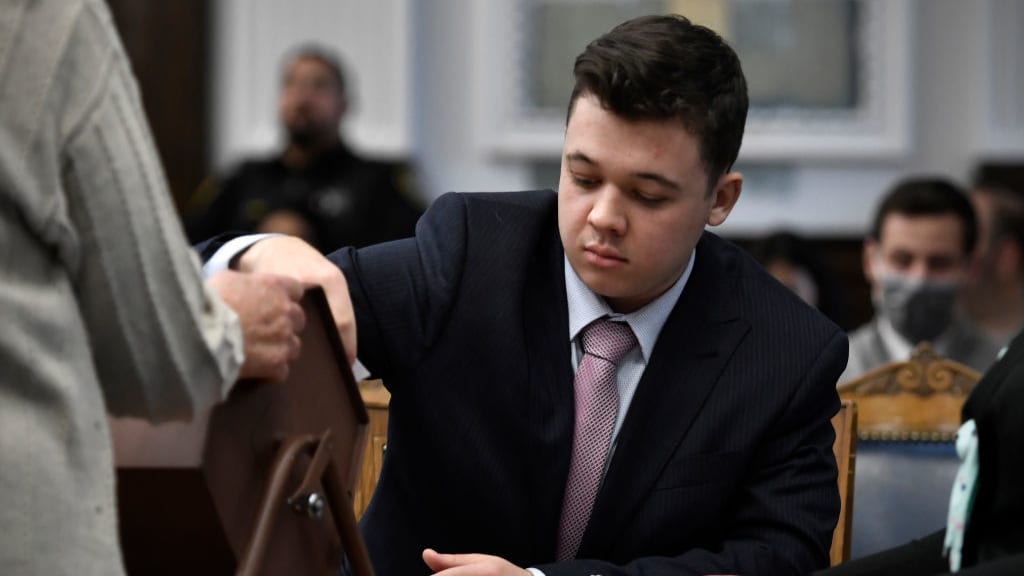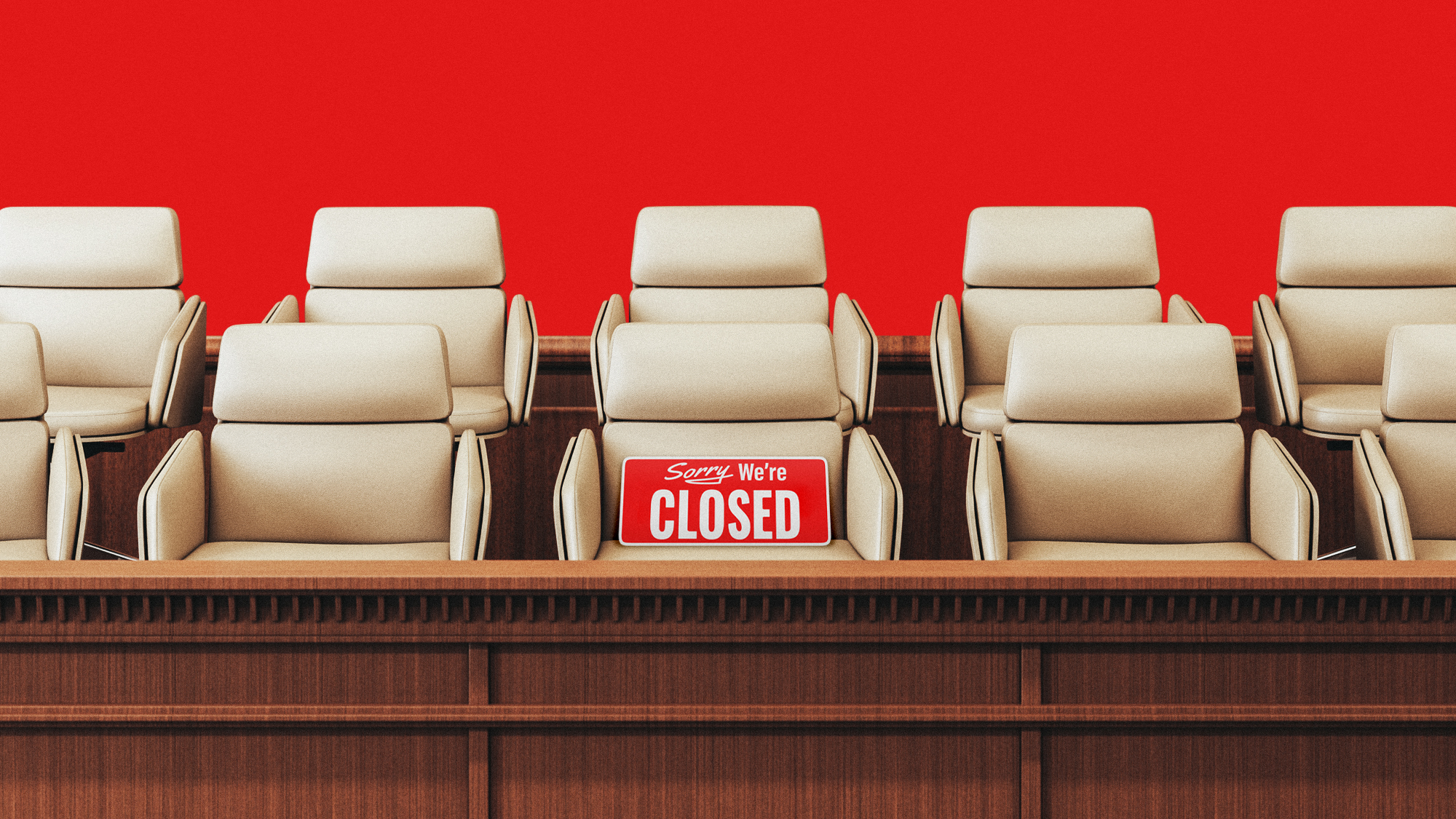Kyle Rittenhouse picks numbers at random to determine his jury


A free daily email with the biggest news stories of the day – and the best features from TheWeek.com
You are now subscribed
Your newsletter sign-up was successful
Kyle Rittenhouse on Tuesday played a part in selecting the jurors who will decide his fate.
They are being tasked with determining whether Rittenhouse is criminally responsible for killing two men he shot during an anti-policy brutality protest in Kenosha, Wisconsin, last year. At the time, Rittenhouse was 17, and left his home in Illinois to join other armed people stationed in front of businesses in Kenosha. Rittenhouse has claimed he acted in self defense.
There were 18 potential jurors who listened to testimony and arguments in the case, and when it came time for them to start deliberating, Rittenhouse was directed by Judge Bruce Schroeder to choose six slips of paper out of a tumbler. Each piece of paper had a number on it, which corresponded to one of the jurors. The six people whose numbers were selected were dropped from the panel, and the remaining 12 — seven women and five men — were sent to deliberations.
The Week
Escape your echo chamber. Get the facts behind the news, plus analysis from multiple perspectives.

Sign up for The Week's Free Newsletters
From our morning news briefing to a weekly Good News Newsletter, get the best of The Week delivered directly to your inbox.
From our morning news briefing to a weekly Good News Newsletter, get the best of The Week delivered directly to your inbox.
In Wisconsin, it's not unusual for there to be a large pool of potential jurors to choose from at the end of arguments. NBC News spoke with several lawyers who said they have only seen judges, bailiffs, or courtroom clerks pick the numbers, and University of Wisconsin-Madison law professor Ion Meyn said it's "a random selection," but there are still "concerns" over Rittenhouse being involved. "To me, from the optics side, it doesn't make sense," Meyn said. "I don't think it was a good idea."
John P. Gross, director of the University of Wisconsin-Madison's Public Defender Project, said "it's completely random, and whoever is picking is picking. It was an interesting piece of theater having the judge inviting the defendant to make the draw." Schroeder has been making headlines throughout the trial, by admonishing prosecutors, saying the people who were shot could not be referred to as "victims," and making eyebrow-raising comments about lunch. Gross said there is no "legal significance" to Rittenhouse making the draw, but "for this case, with this judge, is it a fitting final note? Yes."
A free daily email with the biggest news stories of the day – and the best features from TheWeek.com
Catherine Garcia has worked as a senior writer at The Week since 2014. Her writing and reporting have appeared in Entertainment Weekly, The New York Times, Wirecutter, NBC News and "The Book of Jezebel," among others. She's a graduate of the University of Redlands and the Columbia University Graduate School of Journalism.
-
 How the FCC’s ‘equal time’ rule works
How the FCC’s ‘equal time’ rule worksIn the Spotlight The law is at the heart of the Colbert-CBS conflict
-
 What is the endgame in the DHS shutdown?
What is the endgame in the DHS shutdown?Today’s Big Question Democrats want to rein in ICE’s immigration crackdown
-
 ‘Poor time management isn’t just an inconvenience’
‘Poor time management isn’t just an inconvenience’Instant Opinion Opinion, comment and editorials of the day
-
 The countries around the world without jury trials
The countries around the world without jury trialsThe Explainer Legal systems in much of continental Europe and Asia do not rely on randomly selected members of the public
-
 ABC News to pay $15M in Trump defamation suit
ABC News to pay $15M in Trump defamation suitSpeed Read The lawsuit stemmed from George Stephanopoulos' on-air assertion that Trump was found liable for raping writer E. Jean Carroll
-
 Judge blocks Louisiana 10 Commandments law
Judge blocks Louisiana 10 Commandments lawSpeed Read U.S. District Judge John deGravelles ruled that a law ordering schools to display the Ten Commandments in classrooms was unconstitutional
-
 ATF finalizes rule to close 'gun show loophole'
ATF finalizes rule to close 'gun show loophole'Speed Read Biden moves to expand background checks for gun buyers
-
 Hong Kong passes tough new security law
Hong Kong passes tough new security lawSpeed Read It will allow the government to further suppress all forms of dissent
-
 France enshrines abortion rights in constitution
France enshrines abortion rights in constitutionspeed read It became the first country to make abortion a constitutional right
-
 Texas executes man despite contested evidence
Texas executes man despite contested evidenceSpeed Read Texas rejected calls for a rehearing of Ivan Cantu's case amid recanted testimony and allegations of suppressed exculpatory evidence
-
 Supreme Court wary of state social media regulations
Supreme Court wary of state social media regulationsSpeed Read A majority of justices appeared skeptical that Texas and Florida were lawfully protecting the free speech rights of users
